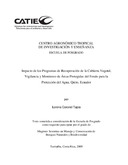Impacto de los programas de recuperación de la cubierta vegetal, vigilancia y monitoreo de áreas protegidas del Fondo para la Protección del Agua, Quito, Ecuador
Fecha de publicación
2009Autor
Coronel Tapia, Lorena
Tipo
Tesis de maestría
Metadatos
Mostrar el registro completo del ítemTítulo alternativo
Impact of the recovery of vegetation, and vigilance and monitoring of protected areas programs of The Fund for the Protection of Water, Quito-Ecuador
Descripción
Tesis (Mag.Sc.) -- CATIE, 2009
Resumen
El Fondo para la Protección del Agua (FONAG) surge, en el año 2000, como una iniciativa de financiar la protección de las cuencas hidrográficas que circundan la cuidad Quito y de esta manera garantizar la disponibilidad y calidad del recurso a lo largo del tiempo. El fondo en la actualidad mantiene seis programas permanentes: Gestión de Recursos Hídricos, Comunicación, Recuperación de la Cubierta Vegetal, Capacitación, Vigilancia y Monitoreo de à reas Protegidas, y Educación Ambiental.el propósito de la investigación fue determinar el impacto que tienen los dos programas permanentes directamente relacionados con la oferta del servicio hídrico, mediante el uso de un sistema de principios, criterios e indicadores (PC&I) diseñado para cada programa.El Programa de Vigilancia y Monitoreo de à reas Protegidas ha sido más eficaz en temas sociales y de conservación, a pesar de eso la gran mayoría de los valores se ajusta dentro del rango no aceptable. The Fund for the Protection of Water (FONAG) appears in the year 2000 as an initiative for financing the protection of water basins that surround the city of Quito, Ecuador and by doing so guaranteeing availability and quality in the long term. The Fund actually executes six permanent prograMON which include: Hydric Resource Management, Communications, Recovery of Vegetation, Training, Vigilance and Monitoring of Protected Areas and Environmental Education.the efforts of this research seek to determine the impact that two of the working prograMON have had in the supply of hydric services, through the use of a system of principles, criteria and data (PC&I) designed for each program.The Vigilance and monitoring of protected areas program has been more effective in social and biodiversity topics, even though most of the specific values for each dimension have adjusted a not acceptable level.
Palabras clave
Asesor
De Camino, Ronnie
Editor
CATIE, Turrialba (Costa Rica)
URI (Enlace permanente para citar o compartir este ítem)
https://repositorio.catie.ac.cr/handle/11554/5209Colecciones
- Tesis [3111]


